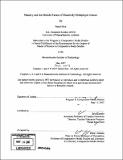| dc.contributor.advisor | Eric Klopfer. | en_US |
| dc.contributor.author | Roy, Daniel, S.M. Massachusetts Institute of Technology | en_US |
| dc.contributor.other | Massachusetts Institute of Technology. Dept. of Comparative Media Studies. | en_US |
| dc.date.accessioned | 2009-01-30T18:33:09Z | |
| dc.date.available | 2009-01-30T18:33:09Z | |
| dc.date.copyright | 2007 | en_US |
| dc.date.issued | 2007 | en_US |
| dc.identifier.uri | http://dspace.mit.edu/handle/1721.1/39150 | en_US |
| dc.identifier.uri | http://hdl.handle.net/1721.1/39150 | |
| dc.description | Thesis (S.M.)--Massachusetts Institute of Technology, Dept. of Comparative Media Studies, 2007. | en_US |
| dc.description | Includes bibliographical references (p. 64-66). | en_US |
| dc.description.abstract | What game design opportunities do we create when we extend massively multiplayer online games (MMOs) to cell phones? MMOs allow us to create representations of our own increasing mastery, and mobile gives us better access to this mastery and allows us to integrate it more fully into the ways we see ourselves. MMOs motivate mastery by making that mastery personally and socially relevant, and visibly showing it increase. Virtual worlds that make players feel physically and socially present increase motivation to achieve mastery. MMOs that convince players their avatars represent some aspect of their personalities increase motivation to invest in and experiment with different constructions of self. I apply these principles to an analysis of two games: Labyrinth, a game I helped create, and World of Warcraft, the current leading MMO. With Labyrinth, I explain the design decisions we made and their impact. With World of Warcraft, I described how altering the design could accommodate mobile play and better motivate increasing mastery. | en_US |
| dc.description.statementofresponsibility | by Daniel Roy. | en_US |
| dc.format.extent | 66 p. | en_US |
| dc.language.iso | eng | en_US |
| dc.publisher | Massachusetts Institute of Technology | en_US |
| dc.rights | M.I.T. theses are protected by
copyright. They may be viewed from this source for any purpose, but
reproduction or distribution in any format is prohibited without written
permission. See provided URL for inquiries about permission. | en_US |
| dc.rights.uri | http://dspace.mit.edu/handle/1721.1/39150 | en_US |
| dc.rights.uri | http://dspace.mit.edu/handle/1721.1/7582 | en_US |
| dc.subject | Comparative Media Studies. | en_US |
| dc.title | Mastery and the mobile future of massively multiplayer games | en_US |
| dc.type | Thesis | en_US |
| dc.description.degree | S.M. | en_US |
| dc.identifier.oclc | 166147145 | en_US |
